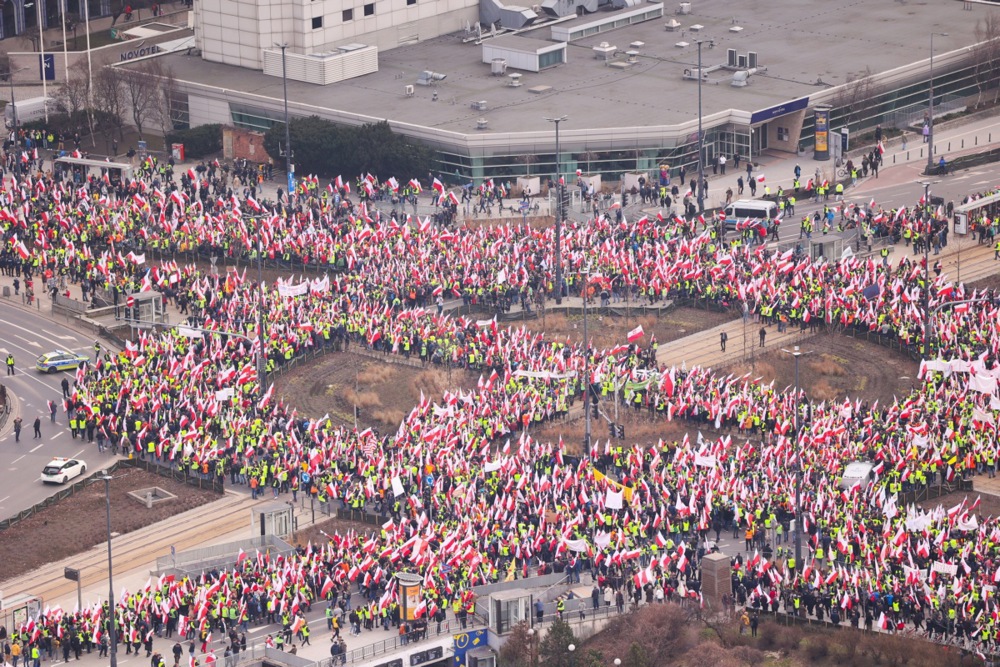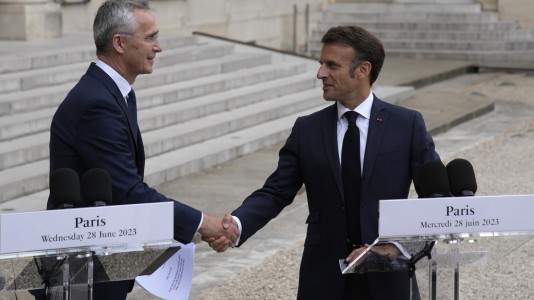In the largest demonstration to date since the protests began on Feb. 9, Polish farmers and their supporters waved red and white Polish flags and carried banners reading “Without us, you will be hungry, naked and sober” and “I am a farmer, not a slave.” Warsaw City Hall estimated the number of demonstrators taking part in the march at just over 10,000.
There were some anti-Ukrainian banners with slogans such as “Take care of your family’s health. Don’t eat crap from Ukraine,” with another one declaring “Enough hospitality towards ungrateful sons of bitches,” with the banner displaying a Ukrainian being kicked out of Poland.
The march proceeded from Warsaw city center towards parliament, where the farmers’ leaders met the speaker of the Polish parliament, Szymon Hołownia, and then onto the Polish prime minister’s chancellery where they met the chief aide to Prime Minister Donald Tusk.
Farmers taking part in the march complained about the inflation generated by the Ukraine war and Ukrainian produce forcing down the prices of their crops. One farmer said that the price of carrots is now lower than it was before the war.
They demanded that the authorities meet their demands, which include abandoning restrictions on agriculture planned under the EU’s “Green Deal” climate package and placing tougher restrictions on agricultural goods from Ukraine.
Prime Minister Donald Tusk, who is currently in Prague for a summit of the Visegrád Group, said that he had heard the farmers’ demands and vowed to take action to address, among other things, trade with Ukraine. He said that the free trade agreement with Ukraine had adversely impacted central European food markets and countered charges that any restrictions on trade would damage Ukraine by reminding people that countries such as Poland and Czechia could not be accused of failing to assist Ukraine.
Agriculture Minister Czesław Siekierski told commercial broadcaster TVN that “the European Commission has imposed excessive, unreasonable, costly Green Deal requirements.” The EU commission has already announced the suspension of the compulsory fallowing of 4 percent of land for larger farms for a year and withdrew the demand for a 50 percent reduction in pesticide use by 2030.
However, this has not been enough to satisfy farmers in Poland and other EU countries, where regular protests have also taken place in recent weeks because they fear suspensions are a temporary fix that may be reversed at any moment. The farmers also say they are not happy about the meeting with Tusk’s chief aide Jan Grabiec because “nothing concrete had materialized.”
Poland’s farmers have been protesting since Feb. 9, blocking roads and border crossings, as well as performing some more radical actions such as spilling out Ukrainian grain from trucks transiting through Poland.
On Monday, Polish farmers began blocking a border crossing with Slovakia, which they claim is being used as a route to bypass the blockade on the Ukrainian border.
Ukraine has reacted angrily to the spilling of grain and has demanded Poland resolve the blockades. The Ukrainian government has threatened retaliatory action if the issue is not resolved by March 28 when the two governments are scheduled to meet in Warsaw for bilateral talks. The Tusk government has decided to classify border crossings as “critical infrastructure,” which means that police may be used to move the protesters from the vicinity of these installations.






